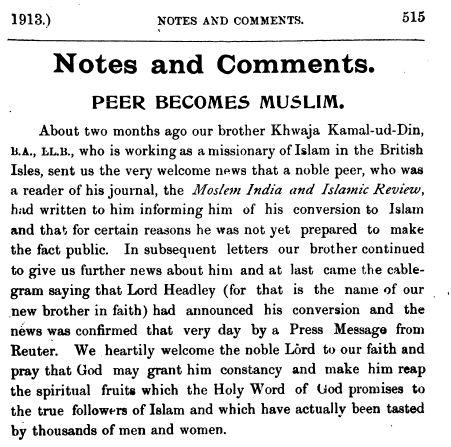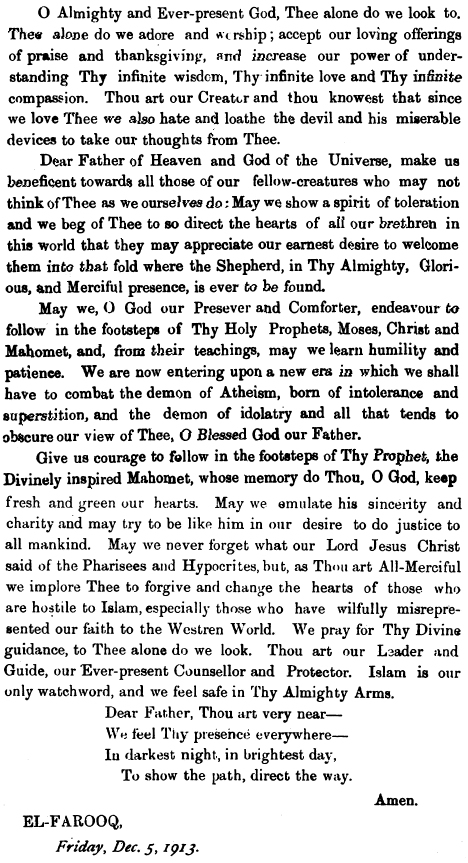Lord Headley:
British press on his conversion to Islam
|
In The Review of Religions of Qadian, the Ahmadiyya
monthly edited by Maulana Muhammad Ali till 1914, the acceptance
of Islam by Lord Headley was first reported in its issue for December
1913 on page 515. Displayed below is the image of the upper part
of that page:

Further on in the same issue of The Review of Religions there are printed extracts from the British press in the U.K.
reporting his conversion. These are quoted below.
The Daily Mirror, November 17, 1913
IRISH PEER TURNS TO ISLAM
That the lure of Eastern religions is affecting
an increasing number of Europeans, is again shown by the announcement
that Lord Headley, an Irish peer, who spent many years in
India, has become a convert to Islam.
The announcement was made by the Rev. Kamal-ud-Din,
who is attached to the Mosque at Woking, at a recent meeting
of the Islamic Society.
Lord Headley, the fifth baron, succeeded only
last January to the title and estates of 16,000 acres in Kerry.
He was born in London in 1855, and has been
distinguished as civil engineer, at one time in India and
latterly specially engaged in foreshore protection works.
He is an all-round sportsman, being fond of
fishing, rowing, skating, swimming, fencing, shooting and
golf. In his youth he won the heavy and middle weights as
an amateur boxer at Cambridge University.
Lord Headley has four sons, having being married
in 1899 to Teresa, youngest daughter of the late Mr. W.H.
Johnson, formerly Governor of Leh and Jumoo. |
The Daily Sketch, November 17, 1913
After a career which has included amateur boxing, civil
engineering, the editing of a local newspaper, and expert
advice on coast erosion, Lord Headley, an Irish Peer, aged
59, became a convert to Mohammedanism.
The conversion was announced at a meeting of the Islamic
Society, held at Frascati’s, Oxford street, by the Rev.
Khwaja Kamal-ud-Din, who is attached to the Mohammedan mosque
at Woking.
“Those who know me will believe I am perfectly sincere
in my belief,” wrote Lord Headley in a letter read at
the meeting.
Lord Headley may be described as a muscular Mussulman, for
when he was at Cambridge he won both the middle-weight and
heavy-weight boxing championships. He has written more than
one book on the noble art of self-defence. He writes very
well, by the way, and has done a good deal of journalistic
work in his time. For a couple of years he was editor of the Salisbury Journal.
He has also done a lot of civil engineering in recent years.
He superintended some coast defence works at Youghal and similar
works on the coast to the north of Bray Harbour. He also did
some coast defence works at Glenbeigh, his place in one of
the wildest parts of Kerry.
A HAPPY CONVERT
The problem of coast erosion has particularly interested
him. At Dover in 1899 he read a paper before the British Association
on the history of the reclamation of Romney Marsh.
Lord Headley is a grey-moustached, handsome man, with a fine
intellectual forehead and good features, while his habit of
smiling when he talks gives him a happy appearance. |
Sheffield Evening Telegraph, 29
November 1913
RELIGION OF ISLAM.
SPREAD OF THE FAITH IN THIS
COUNTRY.
Peer’s new Name.
A quaint and interesting ceremony was witnessed yesterday
at Caxton Hall, London, when about 40 Mussulmans met for the
Juma-Nimaz, or weekly prayer meeting. It is intended in future
that the prayers shall be said every week, but hitherto Mohammedans
have not met regularly in London for religious purposes.
The worshippers included two Englishmen, one of whom was
Lord Headley, whose conversion to Islam was recently announced,
and who has assumed the Moslem name of Saifurrahman Shaikh
Rahmatullah Faruq. Other nationalities represented were India,
Egypt, Turkey, and Persia. The imam, Khwaja Kamal-ud-Din —
a barrister who has left a lucrative practice in Lahore to
minister to the spiritual needs of Moslems in this country,
and act as a missionary here — led the service.
The worshippers removed their boots, but kept their heads
covered. Those who did not wear the regulation red fez tied
their handkerchiefs into improvised turbans.
There were no chairs in the centre of the floor, but white
praying mats were spread instead. Upon these the congregation
stood, knelt, or prostrated themselves, according to the requirements
of the law.
The Khwaja read a portion of scripture from the Koran, and
translated it into English. This was followed by a sermon,
in the course of which he said that the word “Islam”
meant “resignation to the will of God,” or in other
words, evolution, civilisation, and all that was worth striving
for in life.
He announced three new conversions. They were those of the
Viscount de Pudre, a Belgian nobleman, Captain Stanley Marquis,
and Miss Lily Ransom. Two other women converts were also announced,
but for private reasons they did not at present wish their
names to be disclosed.
Lord Headley then rose to address the congregation, which
was seated on the ground. He was greeted with loud cheers
and the clapping of hands, but one of the elders of the community,
Maulvie Zafar Ali Khan, called for silence and impressed upon
the worshippers the necessity for preserving a reverential
attitude.
Lord Headley said that he had great hopes of the spread of
their faith, the simple, purified, and dignified religion
of Islam, in this country. (Several voices: “Amen.”)
He had in his pocket several letters from friends who, he
had not the slightest doubt, would soon come over to them.
They must not hurry these matters, however; they must remember
the difficulties their English brethren had to contend with
especially as regards their families.
Every Mohammedan must assist in spreading the light of Islam;
for himself, he would do all in his power to dispose of the
very common idea that all Mohammedans must shut up their women
in harems and be polygamists. |
In the next issue of The Review of Religions, January 1914, on pages 38–39, a news item from the Daily
Mirror is quoted which is given below:
The Daily Mirror, December 6, 1913
With Lord Headley as one of the worshippers, some thirty
Mohammedans of all nationalities met together yesterday morning
in a room at Lindsey Hall, Notting Hill Gate, to celebrate
the Islamic rite Jooma-Nimaz.
The service began shortly before twelve o’clock.
Before that time the worshippers began to arrive — Turks,
Indians, Persians and men of other nationalities. Not few
of them wore the fez.
Lord Headley, a handsome silver-haired man, wearing a grey
frockcoat arrived shortly before the service began with the
Khwaja Kamal-ud-Din, the leader of the Mohammedans in England.
Mr. Fisher, a young Englishman, who has lived for some time
in Northern Africa, and has been a Mohammedan for ten years,
took part in the service.
After the floor had been covered with spotless white sheets
the men all removed their boots and for a time sat cross-legged
on the floor.
Then came a dramatic incident. One of the company stood up
and in a loud voice — just as they call from the minarets
of the Mohammedan mosques in the East — cried out: “Allah-o-akbar!”
(“God is great”).
The worshippers, many of whom did not wear a fez, covered
their heads with pocket-handkerchiefs, and touched the ground
with their fore-heads as they said their devotions.
For some minutes the worshippers alternately stood up and
bowed their heads to the ground in silent prayer. The scene
was strangely impressive.
The Khwaja Kamal-ud-Din, a tall, imposing Indian with a black
beard and wearing a large, dark turban, then gave an address
with a text from the Sermon on the Mount.
He spoke for over fifteen minutes, and following Moulvie
Zafar Ali Khan also gave an address.
“It is not true what Kipling says that ‘East is
east and West is west, and never the twain shall meet,’”
he said.
“The two are rapidly meeting each other, and Lord Headley
has done much to bridge the gulf between them.”
Lord Headley then came in front of the worshippers to read
the Dua — the prayer.
He spoke in a very clear, distinct voice.
Lord Headley did not remove his boots for the service, but
went through the same formalities of prayer as the other Mohammedans. |
Following the above item from the Daily Mirror, the full text of Lord Headley’s prayer on this occasion is
then printed in The Review of Religions. This is displayed
below in image form:

|

